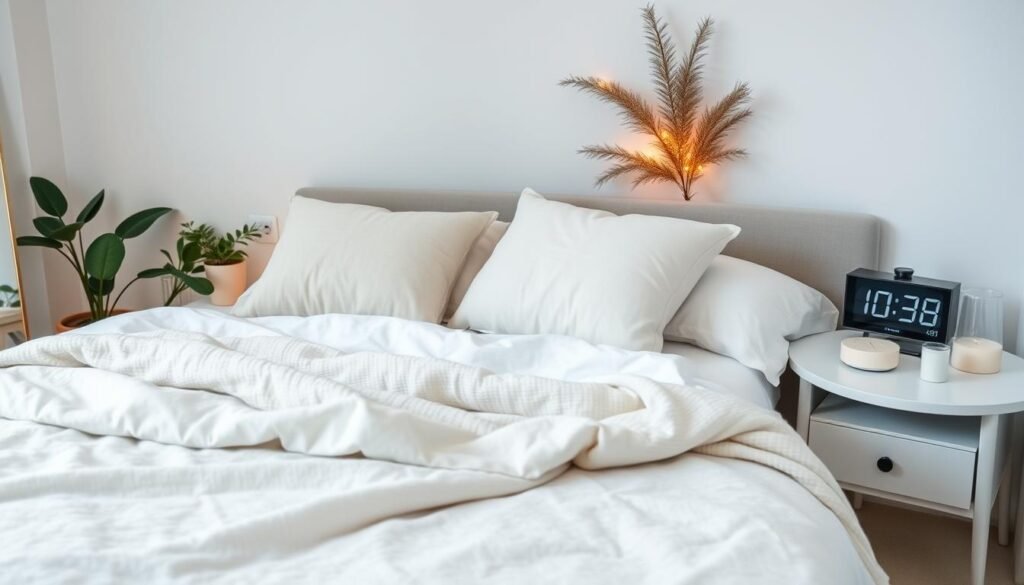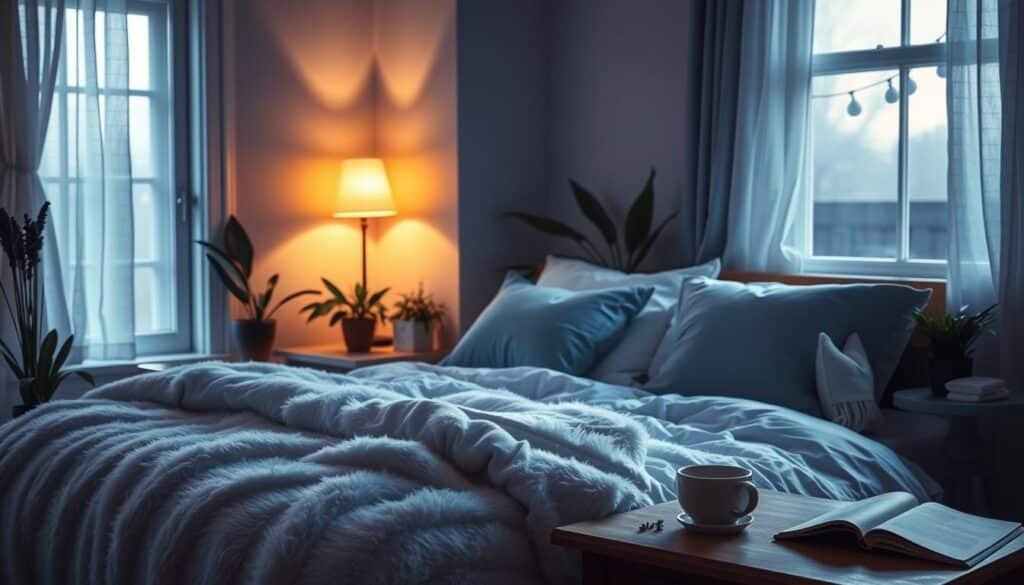Getting enough good sleep is key for staying healthy in body and mind. But, many people have trouble with sleep habits. These habits affect how well and long we sleep. Bad sleep habits can hurt our mental and physical health.
Not sleeping well can lead to problems like poor thinking skills, a weak immune system, and mental health issues. This includes depression, anxiety, and bipolar disorder. On the other hand, good sleep habits can make us feel better overall.
Key Takeaways:
- Sleep is essential for physical and mental health, and poor sleep hygiene can lead to numerous health problems.
- Consistent sleep patterns, quality sleep, and maintaining a healthy circadian rhythm are crucial for overall well-being.
- Addressing sleep hygiene issues through personalized, evidence-based approaches can have a positive impact on both mental and physical health outcomes.
- Understanding the importance of sleep hygiene and implementing practical strategies to improve sleep quality is essential for promoting overall health and well-being.
- Factors such as nutrition, environmental conditions, and behavioral patterns can significantly influence sleep hygiene and quality.
What is Sleep Hygiene?
Getting good sleep is key for our health and happiness. Sleep hygiene is all about the habits we need for healthy sleep. It includes things that help us sleep well and wake up feeling great.
Key Terms Related to Sleep Hygiene
Let’s get to know some important terms in sleep hygiene:
- Sleep Deprivation: Not getting enough sleep or poor sleep quality, which harms our health.
- Circadian Rhythm: Our body’s internal clock that controls when we sleep and wake up.
- Sleep Debt: The build-up of sleep loss over time.
- Sleep Disorder: Conditions like insomnia, sleep apnea, or narcolepsy that disrupt our sleep.
Knowing these terms helps us understand sleep hygiene better. By focusing on what affects our sleep, we can improve our sleep quality. This leads to better health and happiness.
Impact of Nutrition on Sleep Quality

Nutrition is key to good sleep and our body’s clock. Some foods and drinks help us sleep well, while others can make it hard. Eating the right foods can make a big difference in how we sleep.
Inflammatory Foods
Some foods can make our body inflamed, which hurts our sleep. This includes processed meats, sugary carbs, and unhealthy fats. Eating foods that fight inflammation, like fatty fish, berries, and leafy greens, can help. These foods reduce inflammation and boost our health, leading to better sleep.
Stimulants
Caffeine and other stimulants can mess with our sleep. They can make it hard to fall asleep and stay asleep. Cutting down on these substances before bed helps us sleep better.
| Food or Beverage | Impact on Sleep |
|---|---|
| Caffeine (coffee, tea, energy drinks) | Disrupts sleep-wake cycle, makes it harder to fall asleep |
| Alcohol | May initially help with sleep, but disrupts sleep quality later in the night |
| Fatty, fried, and processed foods | Can cause inflammation and disrupt sleep |
| Spicy or acidic foods | May cause discomfort and indigestion, leading to poor sleep |
| Sugary snacks and desserts | Can cause blood sugar fluctuations that impact sleep |
Knowing how nutrition affects sleep quality helps us make better choices. This leads to better health and sleep habits.
Sleep Hygiene

Good sleep hygiene is key for better sleep and health. It means following certain habits and practices. These habits help improve sleep quality. Here are some of them:
- Maintaining a consistent sleep schedule: Stick to the same bedtime and wake-up time, even on weekends. This helps your body get into a regular sleep cycle.
- Creating a relaxing bedtime routine: Doing calming activities like reading, stretching, or meditation before bed tells your body it’s time to sleep.
- Optimizing your sleeping environment: Make sure your bedroom is dark, cool, and quiet for better sleep.
- Limiting exposure to blue light: Don’t use electronic devices like phones or tablets an hour before bed. This helps your body make melatonin, a sleep hormone.
- Avoiding stimulants: Cut down on caffeine, nicotine, and alcohol before bedtime. This can make your sleep better.
Adding these sleep hygiene habits to your daily life can improve your sleep quality. It also supports your overall sleep hygiene and health. Having a regular sleep routine is key to better sleep and health.
| Sleep Hygiene Practice | Benefit |
|---|---|
| Consistent sleep schedule | Regulates the body’s natural sleep-wake cycle |
| Relaxing bedtime routine | Signals the body to prepare for sleep |
| Optimal sleeping environment | Creates a conducive environment for quality sleep |
| Limiting blue light exposure | Promotes melatonin production for better sleep |
| Avoiding stimulants | Improves overall sleep quality |
“Proper sleep hygiene is essential for overall health and well-being. By incorporating these practices into your daily routine, you can unlock the restorative power of quality sleep.”
Environmental Factors Affecting Sleep

Sleep quality can be greatly affected by many environmental factors. It’s important to know how these elements impact sleep. This knowledge helps improve sleep and overall health.
Temperature and Humidity
The best temperature and humidity for sleep vary by person. But, most research says the ideal room temperature is between 65°F (18°C) and 70°F (21°C). Humidity should be between 30% and 50%. High or low temperatures and humidity can make it hard for the body to stay comfortable, affecting sleep.
Sleeping Arrangements
- Mattress quality: A good mattress is key for a great night’s sleep. An old or worn-out one can cause discomfort and poor sleep.
- Bedding: The quality of your sheets, blankets, and pillows affects your sleep comfort and how well you stay cool or warm.
- Noise levels: Too much noise, like from traffic or household sounds, can keep you awake and stop you from getting into deep sleep.
Light Exposure
Light, especially from electronic devices, can mess with your body’s natural sleep cycle. It can lower melatonin production, which is important for sleep. A dark, quiet place helps you sleep better.
| Environmental Factor | Optimal Range | Impact on Sleep Quality |
|---|---|---|
| Temperature | 65°F (18°C) to 70°F (21°C) | High or low temperatures can make it hard to sleep and regulate body temperature. |
| Humidity | 30% to 50% | Too much or too little humidity can make sleeping uncomfortable and affect breathing. |
| Noise | Minimal to no noise | Too much noise can stop you from getting into deep sleep. |
| Light Exposure | Minimal to no light | Light from devices can mess with your body’s natural sleep cycle. |
Knowing how these environmental factors affect sleep quality helps you make better choices. You can create a sleep-friendly environment and improve your sleep habits.
Behavioral Factors Influencing Sleep

Personal habits and behaviors greatly affect how well we sleep. These habits are key to getting good sleep and keeping our sleep healthy. They help decide how long and well we sleep.
Exercise is a big factor. It makes sleep better and helps control stress, which can mess with sleep. It’s good to do some exercise a few hours before bed. This helps without making your body too awake.
Napping is also important. A short nap can refresh you, but too much napping can mess up your sleep cycle. Try to nap for 20-30 minutes, and skip long or late naps.
How and when you go to bed matters a lot for sleep. Sticking to a regular sleep schedule helps your body clock work better. It also makes sleep better. Try not to use devices or have deep talks before bed.
Managing stress is key for good sleep. Stress can make it hard to fall asleep and stay asleep. Using things like meditation or deep breathing can help you sleep better and feel better overall.
By paying attention to these habits, we can make our sleep better. This helps our health, both body and mind.
Relationship Between Sleep and Mental Health

The link between sleep and mental health is deep and complex. Many studies show that bad sleep can hurt mental health. At the same time, mental health problems can make sleep worse.
People with depression, anxiety, bipolar disorder, or schizophrenia often have trouble sleeping. They may feel too tired during the day or have trouble keeping a regular sleep schedule. On the other hand, not sleeping well can make these mental health issues worse.
Long-term lack of sleep can increase the risk of mental health problems. Sleep is key for managing emotions, thinking clearly, and feeling good overall. When sleep is poor, it can lead to more mental health issues.
“Improving sleep hygiene should be a priority for individuals with mental health concerns, as it can have a significant impact on their overall well-being and recovery.”
Helping people with sleep issues through therapies like cognitive-behavioral therapy for insomnia (CBT-I) or sleep education can help with mental health. By sleeping better, people can feel better mentally and live a better life.
In summary, sleep and mental health are closely linked. Good sleep habits are key for staying mentally healthy. They should be part of a full plan for treating mental health.
Also Read : The Importance Of Pediatric Care For Children Health
Conclusion
Sleep hygiene is key to good health and happiness. It affects both our mental and physical health. By following healthy sleep habits, like keeping a regular sleep schedule, making your bedroom sleep-friendly, and managing stress, you can greatly improve your life.
Good sleep is crucial for our mental health. It helps us deal with depression, anxiety, and keeps our minds sharp. Our physical health also depends on sleep. Poor sleep habits can lead to chronic diseases, weight gain, and a weaker immune system.
To improve our mental, physical, and overall health, we should focus on sleep hygiene. By making sleep a priority and using strategies to get better sleep, we can take control of our well-being. This approach not only makes our daily life better but also helps prevent diseases and improves our quality of life in the long run.
FAQs
Q: What is sleep hygiene and why is it important for mental and physical health?
A: Sleep hygiene refers to a set of practices and habits that promote consistent, quality sleep. It is important for mental and physical health because good sleep hygiene can help prevent sleep problems, enhance sleep drive, and reduce sleep disturbances, leading to a better overall quality of life.
Q: How can I improve your sleep hygiene effectively?
A: To improve your sleep hygiene, consider establishing a consistent sleep schedule, creating a comfortable sleep environment, and practicing good sleep hygiene tips such as limiting screen time before bed and avoiding caffeine in the evening.
Q: What are some common signs of poor sleep hygiene?
A: Signs of poor sleep hygiene may include difficulty falling asleep, waking up frequently during the night, feeling tired upon waking, and experiencing daytime sleepiness. These symptoms can indicate a need to address your sleep hygiene practices.
Q: What are the benefits of good sleep hygiene?
A: The benefits of good sleep hygiene include improved mood, better cognitive function, enhanced physical health, and reduced risk of sleep problems. It can also help you get a good night’s sleep and increase your overall energy levels during the day.
Q: How can I create a sleep environment that promotes better sleep hygiene?
A: To create a sleep environment that promotes better sleep hygiene, ensure your bedroom is dark, quiet, and cool. Invest in a comfortable mattress and bedding, and minimize noise and light disturbances to enhance your quality of sleep.
Q: What sleep hygiene recommendations do experts suggest?
A: Experts recommend maintaining a regular sleep schedule, avoiding large meals before bed, limiting naps during the day, and engaging in relaxing activities before going to bed. Following these sleep hygiene recommendations can significantly improve your sleep quality.
Q: How does poor sleep affect overall health?
A: Poor sleep can have a detrimental effect on overall health, leading to increased stress, impaired cognitive function, weakened immune response, and elevated risk of chronic conditions. Prioritizing sleep hygiene is crucial for maintaining good health.
Q: What are some tips for better sleep hygiene before going to bed?
A: Some tips for better sleep hygiene before going to bed include establishing a relaxing bedtime routine, avoiding screens for at least an hour before sleep, and creating a comfortable sleep environment. These practices can help you get better sleep and promote restful nights.
Q: Can sleep medicine help improve sleep hygiene?
A: Yes, sleep medicine can be helpful for individuals struggling with sleep disturbances or severe sleep problems. A healthcare provider can recommend effective treatments that may complement your efforts to practice good sleep hygiene.
Source Links
- https://www.ncbi.nlm.nih.gov/pmc/articles/PMC10105495/
- https://counseling.northwestern.edu/blog/sleep-hygiene-mental-health/
- https://www.sleepfoundation.org/mental-health








Leave A Comment